
Weekly Workshop: Insomnia, ValueHive Podcast, Michael Price, Michael Mauboussin, Pierre Andurand
"You talk about focus. I love to ask people, 'Okay, it's February. If you can only do one thing this year, what would it be? And why?'" Frank Slootman
Hello everyone,
Last week, I was a guest on Brandon Beylo’s Value Hive podcast. I had a blast talking with Brandon about the importance of nuance and the dangers of storytelling in investing, conviction and ego, navigating Fintwit, and some of the people I’ve written about, including Stanley Druckenmiller, Peter Lynch, Bill Miller, and Paul Tudor Jones.
One lesson I learned from the way Brandon built his podcast was the value of consistency. My tendency has been to work on a lot of things in parallel and I’ve long walked a fine line between being productive and getting lost in my notes and to-do lists. This past week, a struggle with insomnia smashed my daily routines and upset the fragile mental web connecting all my books and notepads (think of it as going to sleep at ~11pm but falling asleep at +/- 3am).
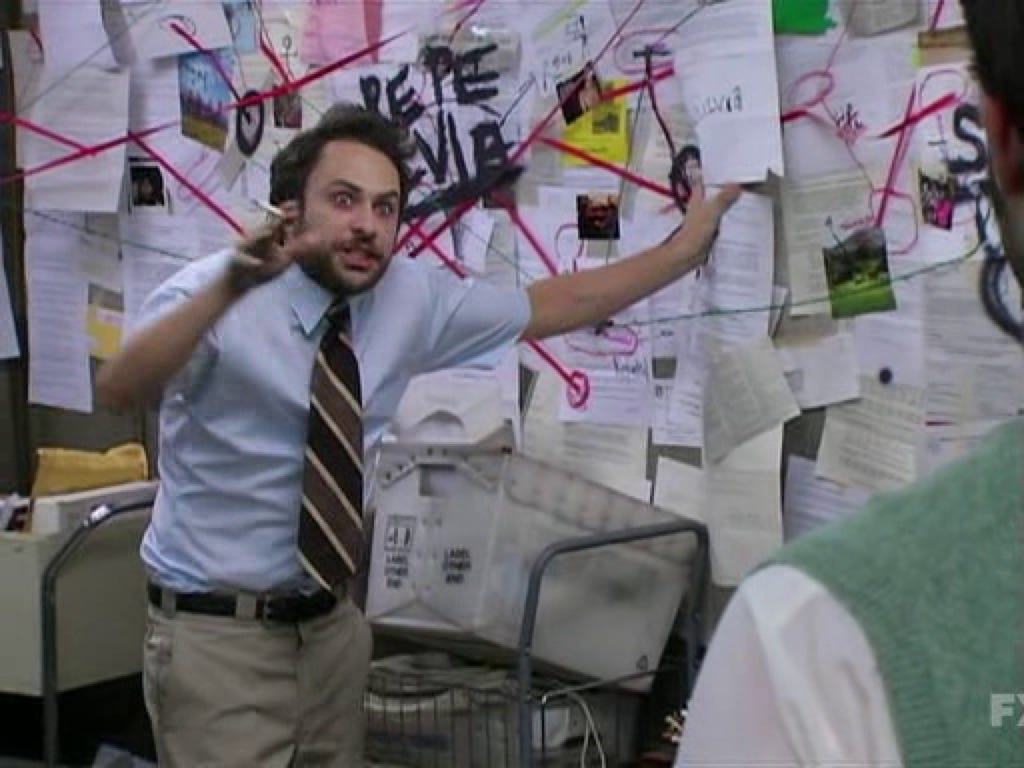
I read that Van Gogh experienced a period of insomnia in Arles during which he produced some of his best work:
“Art historian and curator Joachim Pisarro has claimed that Van Gogh “lived at night” and “didn’t sleep until three or four in the morning. …It was during the night hours that his experiments with imagination and memory went the farthest.” … These paintings feature unorthodox colors and distorted perspectives. In some ways, they may even evoke the feeling of being chronically sleep-deprived.”
Perhaps I just needed to find a better way to channel my sleeplessness into creative output?
Then again, this creative outburst occurred in the final few years of his life, which he ended with the words “the sadness will last forever.” Nope. Not the inspiration I was looking for!
One reason for my sleep issues has been anxiety about my financial future. As of right now, it seems unlikely that writing will provide a sustainable full-time income. It is of course ironic that the pressure of trying to make a living with writing started affecting my ability to be an effective writer.
I consider myself very fortunate to get access to some exceptional people through Twitter, including David Senra who runs the Founders Podcast, an excellent weekly premium podcast. I spoke to David for the first time yesterday and he offered a ton of helpful advice, including the importance of focus. His objective is to build a valuable library of audio content around one core idea: lessons from biographies. That’s it. He says no to all distractions, to all product ideas that aren’t core to his mission.
“People think focus means saying yes to the thing you've got to focus on. But that's not what it means at all. It means saying no to the hundred other good ideas. You have to pick carefully. I'm actually as proud of the things we haven't done as the things I have done. Innovation is saying no to 1,000 things.” Steve Jobs
Our conversation was inspiring but also sobering. I realized that I had to use his insights to overhaul my own work and ensure that I focus on what I do well: deep dives on the most interesting people in investing and business. And that I do so consistently, in a more streamlined and organized fashion, and in a way that maximizes the value to my readers (for example, adding audio to offer an alternative to reading if you’re on the go seems like a no-brainer).
David is of course a content enthusiast and convinced that there is a market for quality work. I loved his optimism and believe that learning and sharing will continue to be my life’s mission. But I also realized that it will require a hybrid solution that provides my mission with the runway for compounding it deserves. I will keep you posted once I know more.
Also last week, legendary value investor Michael Price, passed away and I shared a thread with lessons and quotes from his life. I felt awkward afterwards. Someone had died and my first thought was to turn his life into a piece of content. The speed with which I tried to create something for my audience worried me. I don’t want to see the world as merely a source of ideas and stories to be monetized.
That said, I genuinely believe the lessons of his life are valuable - such as the need to adapt to competition and changing conditions. Price was mentored by Max Heine, an old school value investor and bankruptcy specialist. Price proceeded to make a killing in distressed debt in the 1980s until the business became a lot more competitive.
"The mid-80s were really unique in the bankruptcy game. There was a real window. Inefficiency. I had no competition."
He pivoted to other strategies, including activism, and incorporated multiple strategies into his book. Even so, in an interview with Graham & Doddsville in 2011 one can detect hints of common value investing pathologies such as being attracted to value traps. In his case it was retailers that would have been bargains decades earlier but were being disrupted for good by the new world of (online) commerce.
“Whether it is the low rates, the information, or more people in the business, it is tougher.”
It’s difficult to adapt to a new market regime after a period of tremendous success. I discussed this with Brandon on the podcast and one of the reasons why I want to study a cross-section of investors in my work.
If we are entering a new regime in which “popular narratives meet real world constraints,” as Tom Morgan wrote, we must study success in a variety of domains. We should pay attention to technology, innovation, and great business models, as well as geopolitics, supply chains, and the sectors presenting those constraints such as energy, commodities, and infrastructure. It’s why I want to continue to work on people who navigated very different market environments (Marc Rich is a past example).
It is also why I spoke to Will Thomson of Massif Capital (whose home turf is the real asset ecosystem). Thomson talked about the prospect of de-globalization and spheres of influence for commodities, a theme echoed in this piece:
“The U.S. and China are unified markets that together comprised 42% of global GDP and 52% of global defense spending in 2021. Their ability to leverage hard military power and economic coercion is an insurmountable obstacle to the emergence of the other powers that would make a multipolar world order.”
One of my favorite podcasts last week was the conversation with energy hedge fund manager Pierre Andurand who argued that sanctions are unlikely to disappear until Putin’s regime does, creating lasting strains in commodity markets. Andurand believes that $200 crude oil is required for true “demand destruction” (=a recession). Like Thomson he highlighted the simultaneous pressures of climate change/decarbonization, multi-year investment cycles, and geopolitical tensions.
What many of us took for granted - cheap and abundant energy and food, security, free trade - can be put into question overnight. Going forward, we have to navigate both the impact of power laws in technology and a world whose balance of power is shifting and unstable. It is, to me, an age of heightened insecurity.
“Since the invasion last month, wheat prices have increased by 21 percent, barley by 33 percent and some fertilizers by 40 percent. … ‘There is no precedent even close to this since World War II.’” David M. Beasley, executive director of the World Food Program
“The coronavirus pandemic will mark the dividing line between the deflationary forces of the last 30 to 40 years and the resurgent inflation of the next two decades.” Economist Charles Goodhart in the WSJ
In the works
Next piece on Druckenmiller and lessons from Michael Price’s life.
I also look forward to sharing my conversation with Jimmy Soni about his new book The Founders on the history of Paypal.
Disclaimer: This is not investment advice and is intended for informational and entertainment purposes only. I am not your fiduciary or advisor. My guests and I may be investors in any assets discussed. Do your own research and seek your own financial, tax, and legal advice when considering any financial transactions.
💡 You could be sponsoring posts like this one if you’re looking to reach 8,600+ thoughtful investors and many more readers on Twitter.
This week
Podcasts: Pierre Andurand, Brad Gerstner
Michael Mauboussin on practice and feedback
Letters and write-ups
Twitter Snacks
Podcast: Pierre Andurand and $200 oil
Odd Lots with Pierre Andurand:
“I don't think that suddenly they stop fighting, the oil comes back. It's not going to be the case. The oil’s going to be gone for good. … I think there will need to be a regime change in some way with a regime that we feel we can trust – we as in the West - before the sanctions are lifted or at least a big part of, of the sanctions are lifted. … Generally what brings the demand destruction is some kind of economic crisis.
Q: What level would be worrying to you in terms of demand destruction?
I think, like close to $200 a barrel - so much higher than today. I feel like there's no demand destruction at $110 a barrel and we'll have to go significantly higher before demand can go down by enough. But that's also assuming there's no government mandate … there could be some solutions like that to bring demand down, but if there's no government mandate, then I think that around $200 oil will be enough to bring demand to balance the market.”
Podcast: Brad Gerstner on Acquired
Really enjoyed this conversation with Brad Gerstner of Altimeter. Gerstner has a rare background as both a founder/operator and investor. His journey follows the internet’s evolution from search and vertical commerce (like online travel), to mobile and social media, followed by cloud and vertical SaaS. I like how he framed his mission through the lens of his key partners:
"What I love about this business is there's a scoreboard. At a hedge fund it's a painful scoreboard. It's every day. In the venture business there's a lag. But at the end of the day, your reputation among founders, it's a two-sided marketplace. What's my NPS score among founders. And what's my NPS score among funders. The people who entrust me with their capital. I get up every day thinking, 'How do we build the best product for both of those folks?' Because if we do, and we deliver the returns, then we have a great business."
Michael Mauboussin on practice and feedback
Great piece on how to use feedback and deliberate practice to improve as a forecaster/investor (my notes on twitter).
“Superforecasters and investors ... seek to anticipate outcomes in a probabilistic world by understanding the past, updating their views to reflect new information, and working hard.”
“Beliefs are hypotheses to be tested, not treasures to be protected.”
“This requires being comfortable with the sense of doubt and recognizing that degrees of doubt are a better way to approach problems than settling on certainty. Humility stems from a recognition that the world is complex, not from self-doubt. Finally, superforecasters don’t believe what happened had to happen and are open to considering counterfactuals.”
“The big ideas are to think in probabilities and to update views as new information is revealed. This is difficult in the face of confirmation bias, which is one of the most potent cognitive challenges.”
Letters and write-ups
We’re at the end of Q4 letter season and there’s a rich repository of letters available on Reddit.
This week we got a deep dive on the state of software valuations by Voss Capital.
""High-fliers" were historically valued at 4.5-7.0x sales until a massive breakout beginning around 2017. During this euphoria phase peaking in mid-2021, the group more than quadrupled their multiple to over 30x sales. … the most expensive names now have the *least* downside to their historical average revenue multiple, although there is still 24% downside as of mid-March."
If you’re interested in detailed takes on energy and commodities, check out Goehring & Rozencwajg - “The distortions of cheap energy.”
MBI Deepdives published a free take on Meta: What’s embedded in Meta’s stock price?
Also on big tech, you might be interested in this deep dive on the cloud infrastructure oligopoly: Planetary-Scale Computation: An industry primer on the hyperscale CSP oligopoly (AWS/Azure/GCP):
This primer's main section, "Three-Body: Competitive Dynamics in the Hyperscale Oligopoly", is the section of most relevance from a business/industry analysis perspective. … an attempt at explaining the triopolistic (as opposed to fragmented or monopolistic) industry structure of cloud infrastructure [i.e., "Why three hyperscalers?"]
🤯Insecurity Analysis depends on its readers for support. If you enjoy my work and would like to support it, consider becoming a free or paid subscriber.
Twitter Snacks:
Random German word that even I did not know existed but, having seen it, immediately nodded my head: “yeah, that sounds like something my people would come up with”:

Games of strategy:
“Chess is not a game. Chess is a well-defined form of computation. … Real life consists of bluffing, of little tactics of deception.”
Peter Lynch on volatility:
“I think volatility is terrific. It's a great opportunity if people understand what they own. The market ought to double in the next 8-9 years and again 8-9 years after that. Because profits go up and stocks follow. That's all there is to it.”
(Given his burnout, take this with a grain of salt.)
Joel Greenblatt class on spin-offs:

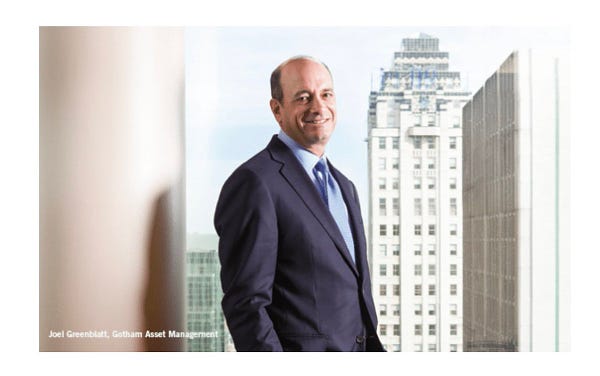
Enjoyed this piece? Please let me know by hitting the ❤ button. It makes my day to see whether my readers like the content. Thank you!
If you enjoy my work, please consider sharing it with friends who might be interested.🙏





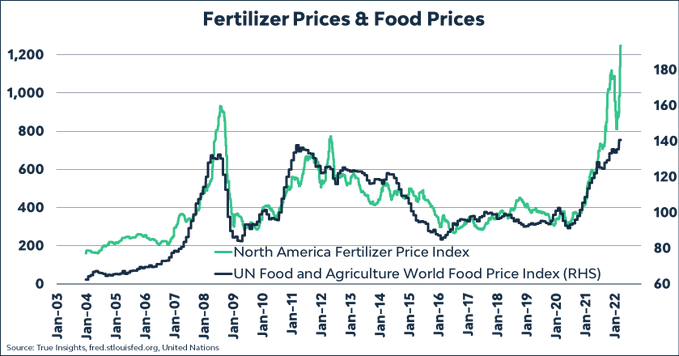
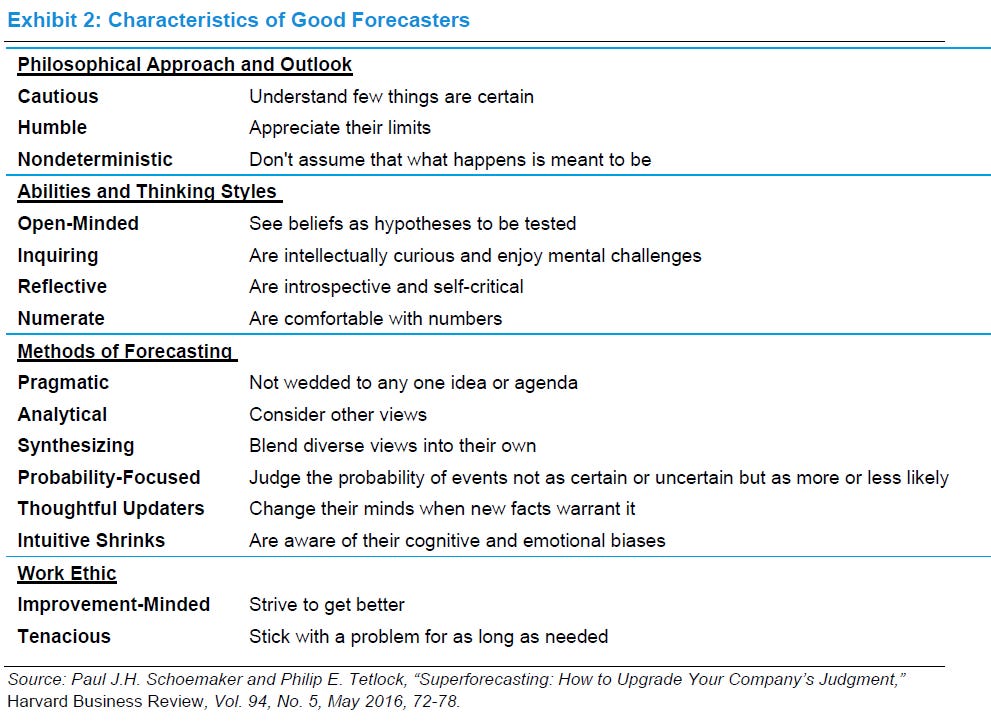

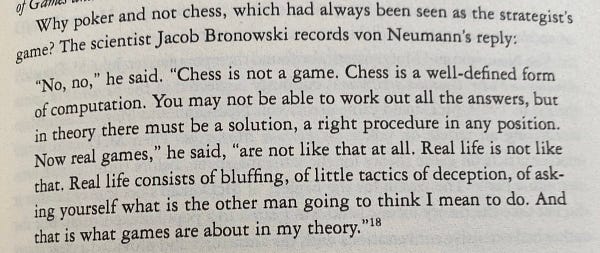

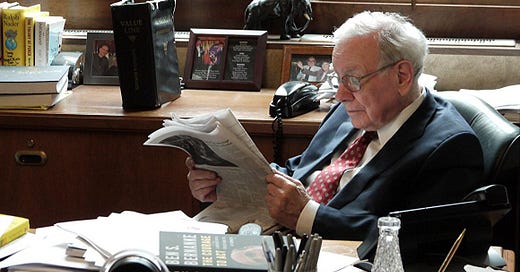



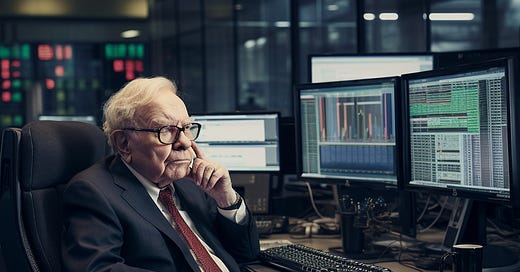

David's the best, glad you two talked!
Cheers 💚 🥃
I appreciated your thoughts on making a living writing. I'm in a similar boat having launched a paid investment newsletter a year ago this month. It's like "if I could just 10x my subscribers I'd be all set". I get frustrated at all the marketing, funnels, etc. and just want to focus on the core product. That's perhaps the worst part of it. Anyway enough of this rant, just wanted to say hello to a fellow traveler.